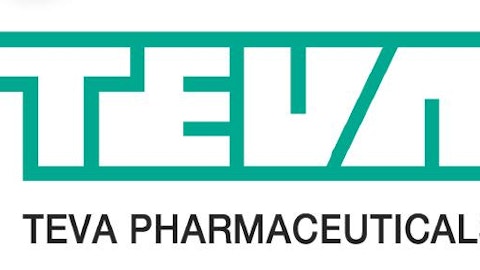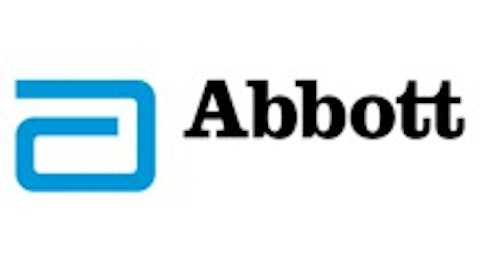Uncertainty creates opportunity for long-term investors, and there is a lot of uncertainty in the healthcare sector right now. As a result, opportunistic investors should take a closer look at companies in this sector.
Companies like Johnson & Johnson (NYSE:JNJ), Merck, and Pfizer Inc. (NYSE:PFE) may be well followed, but, even so, the market sometimes underestimates their earning power. The patent cliff has created enormous uncertainty surrounding these companies’ future revenues, so investors who can reasonably estimate the impact of the patent cliff on their profitability stand to make outsized returns.

The shrinkage of the pharmaceutical segment’s overall contribution has more to do with tailwinds in other segments rather than patent expirations. As the baby boom generation continues to grow older — and live longer — all of Johnson & Johnson (NYSE:JNJ)’s segments should receive a noticeable boost in demand. As a result, the patent cliff is hardly a concern for the company’s long-term earning power.
Pfizer Inc. (NYSE:PFE) and Merck, on the other hand, have suffered greater setbacks as a result of expiring patents, but have new drugs coming down the pipeline. For instance, Singulair, Merck’s single largest revenue source, recently went off patent. However, the company’s new HIV drug and diabetes drug are expected to soften the blow from the loss of Singulair.
Pfizer Inc. (NYSE:PFE), on the other hand, acquired Wyeth in an attempt to shore up its portfolio. The merger is expected to enable the company to earn higher margins, but most of the improvement so far has come through cuts to research and development — which may impact the company’s pipeline.
Investment merits
Johnson & Johnson (NYSE:JNJ) is set to benefit from tremendous tailwinds over the coming decade, while Merck and (NYSE:MRK) Pfizer scramble to replace lost revenue with new drugs. Although the market is aware of these companies’ relative situations, there may still be opportunity in the shares.
On the surface, the price to earnings multiples look unattractive. Johnson & Johnson (NYSE:JNJ) trades at 25 times earnings, Merck at 24 times earnings, and Pfizer Inc. (NYSE:PFE) at 14 times earnings. However, the normalized figures are more attractive. Johnson & Johnson trades at 19 times my estimate of normalized free cash flow, and Merck and Pfizer at 15 times.
Although you may quibble with my estimates of future free cash flow, it is clear that each company will generate enough cash over the next decade to make today’s price to earnings ratios seem higher than they really are. Pfizer Inc. (NYSE:PFE), in particular, tends to generate more cash than it reports in GAAP earnings. So, while it may seem like the market is pricing Merck at 24 times earnings, it is really priced much more reasonably.
However, none of these companies would be classified as a Charlie Munger “cannibal.” Merck has substantially increased its shares outstanding over the last decade, while Johnson & Johnson (NYSE:JNJ) and Pfizer Inc. (NYSE:PFE) have kept shares outstanding at about the same level. When there is ambiguity as to how cheaply a stock is priced, as is the case here, I would prefer to count on reductions in shares outstanding. As a result, I will wait for these stocks to get a little cheaper before diving in.
Ted Cooper has no position in any stocks mentioned. The Motley Fool recommends Johnson & Johnson. The Motley Fool owns shares of Johnson & Johnson.
The article Large Cap Stocks Are Cheaper Than They Appear originally appeared on Fool.com.
Copyright © 1995 – 2013 The Motley Fool, LLC. All rights reserved. The Motley Fool has a disclosure policy.





